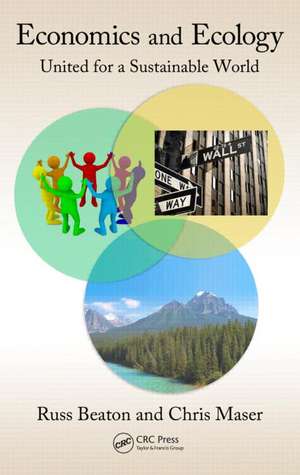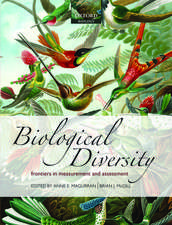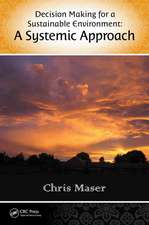Economics and Ecology: United for a Sustainable World: Social Environmental Sustainability
Autor Charles R. Beaton, Chris Maseren Limba Engleză Hardback – 5 aug 2011
Co-written by an ecologist and an economist, Economics and Ecology: United for a Sustainable World counsels the replacement of symptomatic thinking with a systemic worldview that treats the environment and the economy as an ecosystemic unit. The first part of the book establishes the methodological and biophysical principles needed to develop the concept of socioeconomic sustainability. The second part of the book examines the misuse of economics in the service of what increasingly appears to be a ruinous pursuit of material wealth and expansion. The third part offers advice on reconciling economics and ecology by proposing an economics in which the principles employed are aligned with the biophysical principles of ecology.
This timely volume puts forth a sustainable worldview based on systemic thinking, with the emphasis more on what and how people think than on what they do. A unique reference for professionals and laypersons alike, it can also serve as a supplementary classroom text for students of economics, ecology, biology, and environmental science.
| Toate formatele și edițiile | Preț | Express |
|---|---|---|
| Paperback (1) | 585.27 lei 6-8 săpt. | |
| CRC Press – 31 mai 2017 | 585.27 lei 6-8 săpt. | |
| Hardback (1) | 1380.66 lei 6-8 săpt. | |
| CRC Press – 5 aug 2011 | 1380.66 lei 6-8 săpt. |
Preț: 1380.66 lei
Preț vechi: 1683.73 lei
-18% Nou
Puncte Express: 2071
Preț estimativ în valută:
264.20€ • 277.10$ • 219.93£
264.20€ • 277.10$ • 219.93£
Carte tipărită la comandă
Livrare economică 01-15 aprilie
Preluare comenzi: 021 569.72.76
Specificații
ISBN-13: 9781439852958
ISBN-10: 1439852952
Pagini: 220
Ilustrații: 1 b/w image
Dimensiuni: 156 x 234 x 14 mm
Greutate: 0.49 kg
Ediția:New.
Editura: CRC Press
Colecția CRC Press
Seria Social Environmental Sustainability
ISBN-10: 1439852952
Pagini: 220
Ilustrații: 1 b/w image
Dimensiuni: 156 x 234 x 14 mm
Greutate: 0.49 kg
Ediția:New.
Editura: CRC Press
Colecția CRC Press
Seria Social Environmental Sustainability
Public țintă
Economists; ecological economists; ecologists; biologists; and students from environmental studies, economics, and social sciences studying climate change, ecological problems, sustainable agriculture, and related issues.Cuprins
Introduction. SETTING THE STAGE: Methodological Overview. Energy—The Critical Resource. ECONOMICS IN THEORY AND PRACTICE: The Innate Nature of Economics. Consumption Theory. Production. Externalities. Distribution. Macroeconomics – Is It Still Helpful in an Age of Scarcity? RECONCILIATION AND LOOKING TO THE FUTURE: The Meaning of Social-Environmental Sustainability. Imagining the Ideal World. Counsel for Getting There. Appendix. Index.
Notă biografică
Russ Beaton received his bachelor’s degree from Willamette University in Salem, Oregon, and his Master’s and Ph.D. degrees from Claremont University, California. His original training was in mathematical economics and econometrics, although his doctoral thesis was in location theory and urban land economics, which became a lifetime interest.
After teaching for 3 years at California State College at Fullerton (now Fullerton State University), and 4 years at Simon Fraser University in Vancouver, British Columbia, Canada, Beaton returned to his alma mater, Willamette University, where he taught economics and did research for 33 years.
He has consulted and done policy-based contract research for at least six different agencies of the State of Oregon, in areas such as land use, agriculture, timber, transportation, energy, housing, and general economic policy.
Beaton is coauthor with Chris Maser of two other books and participated in drafting the legislation, passed by the 1973 Oregon Legislature, that created Oregon’s widely acclaimed land use planning system.
Chris Maser was trained in zoology and ecology and worked for 25 years as a research scientist in agricultural, coastal, desert, forest, valley grassland, shrub steppe, and subarctic settings in various parts of the world before realizing that science is not designed to answer the vast majority of questions society is asking it to address.
Maser gave up active scientific research in 1987 and has since worked to unify scientific knowledge with social values in helping to create sustainable communities and landscapes, part of which entails his facilitating the resolution of social-environmental conflicts. He has contributed to more than 286 publications, including 34 books, mostly dealing with some aspect of social-environmental sustainability.
Although he has worked and lectured in Canada, Egypt, France, Germany, Japan, Malaysia, Mexico, Nepal, Slovakia, and Switzerland, he calls Corvallis, Oregon, home.
After teaching for 3 years at California State College at Fullerton (now Fullerton State University), and 4 years at Simon Fraser University in Vancouver, British Columbia, Canada, Beaton returned to his alma mater, Willamette University, where he taught economics and did research for 33 years.
He has consulted and done policy-based contract research for at least six different agencies of the State of Oregon, in areas such as land use, agriculture, timber, transportation, energy, housing, and general economic policy.
Beaton is coauthor with Chris Maser of two other books and participated in drafting the legislation, passed by the 1973 Oregon Legislature, that created Oregon’s widely acclaimed land use planning system.
Chris Maser was trained in zoology and ecology and worked for 25 years as a research scientist in agricultural, coastal, desert, forest, valley grassland, shrub steppe, and subarctic settings in various parts of the world before realizing that science is not designed to answer the vast majority of questions society is asking it to address.
Maser gave up active scientific research in 1987 and has since worked to unify scientific knowledge with social values in helping to create sustainable communities and landscapes, part of which entails his facilitating the resolution of social-environmental conflicts. He has contributed to more than 286 publications, including 34 books, mostly dealing with some aspect of social-environmental sustainability.
Although he has worked and lectured in Canada, Egypt, France, Germany, Japan, Malaysia, Mexico, Nepal, Slovakia, and Switzerland, he calls Corvallis, Oregon, home.
Descriere
This timely reference discusses the problems of environmental and economic crises and explains how they are the product of the overextension of resources. The book critiques the standard approach of economics and establishes the methodological and biophysical principles needed to develop the concept of socioeconomic sustainability. Emphasizing that movement along the path towards economic, environmental, and social sustainability begins with the individual, the authors offer advice on reconciling the principles of economics and ecology. They propose a worldview based on systemic thinking that treats the environment and economics as an ecosystemic unit.
























